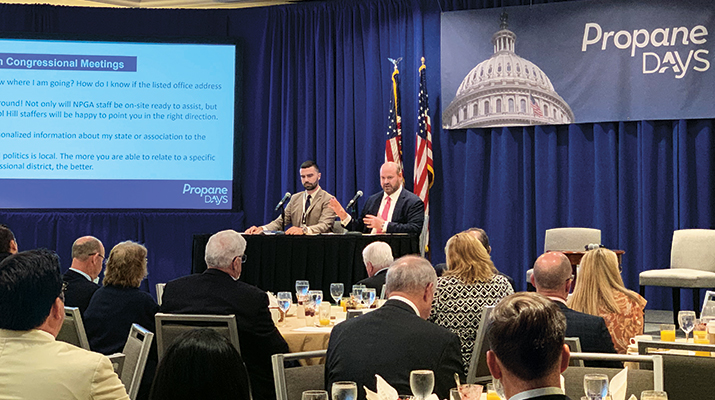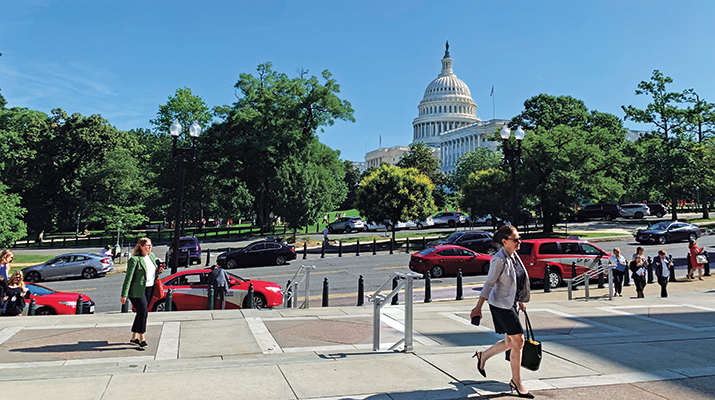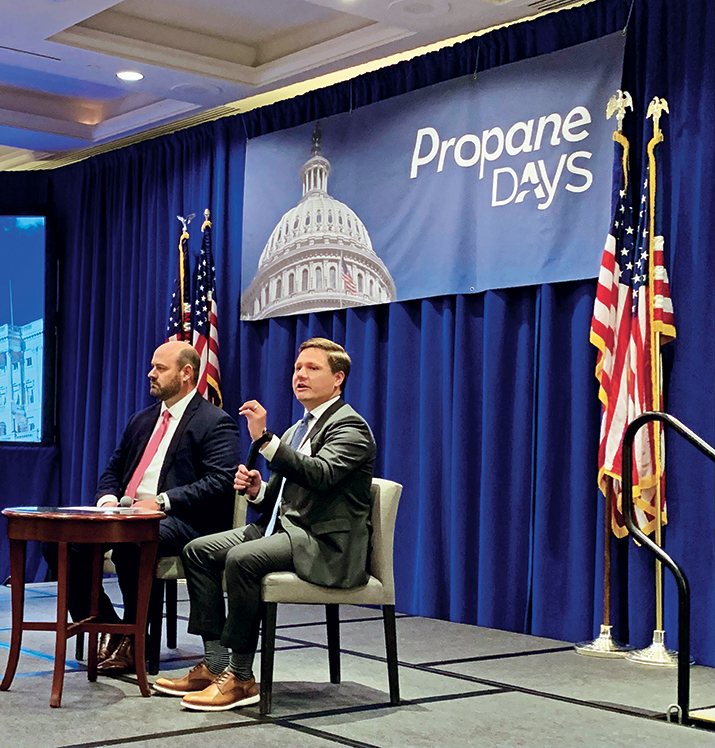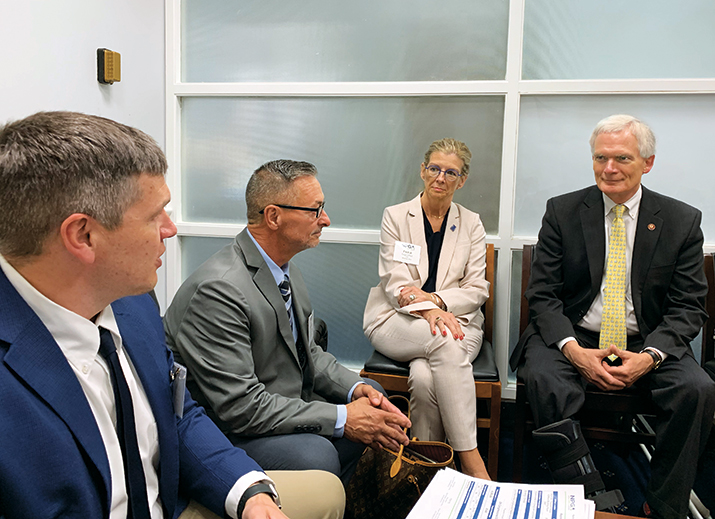New editor recounts first Propane Days experience

The industry visited Capitol Hill to meet with lawmakers and advocate for propane.
I joined LP Gas magazine on May 6. Before that, I had next to no idea what propane was. I knew my dad bought small cylinders of it for our grill, but that was it.

Markham
Since then, I’ve learned more about propane and the propane industry than I ever thought was possible. I told Brian Richesson, my editor in chief, that I learn best by jumping headfirst into the fire. And that’s exactly what he let me do when he booked my ticket to Washington, D.C., for this year’s Propane Days.
Brian thought bringing me out to the industry’s biggest lobbying event would be a great way for me to learn about the industry firsthand and meet a lot of people, and he was right. I lost count of all the people I met, all the names I learned, all the hands I shook.
We arrived in D.C. on Sunday night and left on Tuesday night. Those 48 hours were a fast-paced whirlwind packed to the brim with new people, events and education. When I got back home to my apartment on the west side of Cleveland, I was exhausted, but I was also energized. I was so excited that I got the opportunity to cover such a fascinating industry.

The propane industry is engaged in legislative battles to preserve energy choice for consumers.
Propane patriots
One surprise from Propane Days that stuck with me was the reciting of the Pledge of Allegiance at the start of the National Propane Gas Association’s (NPGA) annual meeting and board of directors meeting. I don’t think I’ve been to an event that involved everyone reciting the Pledge since I was in high school, so it was a slight shock. I scrambled to put down my fresh cup of coffee and stand up with the rest of the group to say the Pledge together.
Once everyone had finished and I sat back down and picked up my coffee, I felt a sense of appreciation. Brian brought me to Propane Days to introduce me to this industry that, a month ago, I hardly knew existed. He wanted me to meet the people who made up the industry and get an idea of who they were. And in that moment, I got an idea of exactly who they were: patriots.
The people I met in the industry that day were patriots who cared about their country and wanted to take care of it and help it succeed. Each person working in this industry could’ve worked in any other field, but they all chose propane. Everyone has their own reasons for joining and staying in the field, but I think, in that moment, I realized that a great deal of them did it because they care about their fellow people.
Propane fuels people’s lives. It heats their homes, it cooks their food, it dries their crops, it powers their trucks and school buses. Propane takes care of people. There are a lot of ways to earn a living, especially today. But I think the professionals who make their living in propane chose to do so because they can better people’s lives and not just make money.
Staying ‘green’
Another thing I’ve learned about the propane industry is that it’s a “green” industry, much to my initial surprise.
I’m fairly young. Like many people in my generation, I care about the planet, and I’m interested in green energy sources that will help keep the planet around for as long as possible. Before I started working at LP Gas, I didn’t think propane was such an energy source. In my mind, I lumped propane in with natural gas, oil, coal and diesel. But after learning from Brian and the many industry professionals at Propane Days, I’ve realized that propane is so much more than just another “dirty fossil fuel.”
I think my experience is indicative of one of the major challenges the propane industry is facing that was talked about a lot at Propane Days: consumer and public perception.
The average consumer probably doesn’t know much about propane. Like me, when most people think about propane, they probably just think about grills and, for those who have good taste in TV shows, Hank Hill.
And when someone thinks of a clean-burning energy source, they probably aren’t thinking of propane. They’re probably thinking of electric power. And with the massive electrification push sweeping the country, why wouldn’t they? After all, that’s all everyone is talking about these days. Electric energy, electric cars, electric stoves, electric everything. People are obsessed with electric power and turn their nose up at propane because it’s a “fossil fuel.”
But rejecting propane isn’t doing anyone any good. In fact, it’s hurting people, and not just propane retailers and suppliers. As discussed at Propane Days, the push to electric is hurting the average consumer, and they don’t even know it because they don’t know enough about propane.
Legislative showdown: Gas bans vs. consumer choice
Consumer choice was a frequent talking point at Propane Days, specifically how it’s come under threat lately. Environmentalists keep pushing for laws and regulations that ban the use of fossil fuels, including propane.
Perhaps the most infamous among these laws was the “gas stove ban” that Berkeley, California, introduced in 2019, so named because it banned natural gas hookups in new construction. While the 9th U.S. Circuit Court of Appeals overturned the ban in 2023 and struck down a challenge to that ruling in April 2024, the battle didn’t end there. In 2023, New York state banned natural gas appliances in most new buildings by 2026, and the Oregon state legislature introduced a measure that gives local governments the ability to ban fossil fuel equipment and infrastructure installations in new buildings, according to the NPGA.
The propane professionals at Propane Days expressed wanting the customer to choose for themselves. If people want to use a propane-powered stove or live in a gas-heated home, the government shouldn’t get in the way of that. After all, consumers should be able to decide what kind of stove they want to use and what kind of house they want to live in.
This is the logic behind H.R. 6089, the Energy Choice Act, which seeks to protect consumer choice by banning the bans on propane and other fossil fuel energy sources. Passing this act will allow consumers to continue using and installing gas stoves, furnaces and water heaters.

Issues at stake during this year’s Propane Days were consumer choice, use of propane at military bases, the Farm Bill, the alternative fuel tax credit and clean energy appropriations.
Fueling the military
I also learned about how the importance of propane goes beyond consumer use, with applications in military bases.
U.S. military bases use diesel and gasoline for their power. As everyone in the propane business knows, propane is less expensive and creates less emissions than both diesel and gasoline, but apparently the military and Congress don’t know that. Luckily for American service members and taxpayers, propane retailers were on Capitol Hill to tell congresspeople about how propane offers cheaper and cleaner power to military bases.
NPGA sees an opportunity to use the fiscal year 2025 National Defense Authorization Act to promote propane in Department of Defense facilities. Specifically, NPGA’s goal is for U.S. military bases to replace their diesel generators with propane generators.
It’s crucial for the military to always be mission-ready, able to power their bases and facilities in any condition, under any circumstances. According to the NPGA, propane-powered generators can meet the energy needs of military bases, with the additional advantages of propane being non-toxic, portable, unsusceptible to degradation and able to produce near-zero emissions.
NPGA believes that switching American military bases to propane generators would also be good for the nation’s energy independence. The U.S. is a net exporter of propane. So, if U.S. military bases used propane, they would not be dependent on other nations for fuel. Instead, they could rely on fuel produced right here in the U.S. This transition would be crucial for U.S. energy independence.
Propane in the Farm Bill
Another topic of discussion at Propane Days was the Farm Bill, which NPGA describes as the most important piece of legislation related to farming and agriculture. Congress typically renews the Farm Bill every five years, but the last Farm Bill was given a one-year extension.
NPGA’s goal for this year’s Farm Bill is to clarify a provision of the Farm Storage Facility Loan Program, which financially incentivizes grain producers to build and upgrade commodity storage facilities, to ensure that it includes propane. Doing so would give agriculture producers access to loans they can use to increase and improve their on-site propane storage, according to NPGA.
However, increasing farmers’ propane storage capacity may not do any good if the Department of Homeland Security’s Chemical Facility Anti-Terrorism Standards (CFATS) program has anything to say about it. This program places what the NPGA calls an arbitrary ceiling on the amount of fuel, including propane, the agriculture producer can store without facing reporting requirements.
Although the program expired in 2023, there’s a chance that Congress could reauthorize the program. NPGA is trying to get ahead of this possibility by seeking to create an exception in CFATS for propane storage in retail agriculture facilities, so such businesses can store as much propane as they see fit.

Ohio propane marketers meet with Rep. Bob Latta, R-Ohio, co-chair of the Congressional Propane Caucus and longtime friend of the industry.
Tax credit
NPGA estimates almost 200,000 vehicles currently run on propane autogas in the U.S. That’s a lot of vehicles, but if Congress implements more propane-friendly tax policies, there could be even more in the future.
To this end, NPGA is asking Congress to extend the alternative fuel tax credit by at least two years. This provision provides a credit of 37 cents per gallon on the sale of propane used in motor vehicles. Currently set to expire on Dec. 31, the tax credit makes propane and other alternative fuels more attractive to consumers who want to use alternative fuels to power their vehicles.
NPGA says extending the alternative fuel tax credit would benefit consumers, the economy and the environment.
Federal appropriations
According to the NPGA, the association has secured more than $20 million in Department of Energy funding for research and development of using propane and dimethyl ether in vehicles, propane-powered combined heat and power (CHP) systems, and renewable propane.
NPGA is seeking more propane-related appropriations for fiscal year 2025, including $4 million toward production of renewable propane, which is molecularly identical to regular propane, can be used in propane-powered applications with no modifications necessary, is made from oils, fats and grease residue, and is a concept that, frankly, still blows my mind. The association’s goal here is to boost production of renewable propane, which is not currently in widespread production.
On top of that $4 million, NPGA is requesting appropriations for micro-CHP and microgrid technology, with the goal of securing investment to research micro-CHP propane technology and develop propane-fueled microgrids.
FAA reauthorized for five years
A topic that was originally on the agenda for Propane Days was the Federal Aviation Administration’s (FAA) Reauthorization Act of 2024, but it was passed and signed into law just before the event.
NPGA says it helped to preserve propane’s inclusion and eligibility for two programs in the act, which President Joe Biden signed into law on May 16.
The law reauthorizes the FAA and related revenue authorities, as well as the National Transportation Safety Board, through Sept. 30, 2028.
The programs provide financing to airports so they can purchase alternative fuel vehicles and propane-powered generators, NPGA says.
In conclusion
It goes without saying that my first Propane Days was surprising and informative. I learned a lot about the propane industry, the challenges it’s facing and the people who make it run.
If there was one disappointment I had at Propane Days, it was that I didn’t get to see many congresspeople.
We met Rep. Bob Latta, R-Ohio, co-chair of the Congressional Propane Caucus and longtime friend of the industry, in the morning, which was a great start to the day. But after that, we only met with congressional staffers. I didn’t even see any congresspeople walking through the halls of the Capitol, except for Rep. Jim Jordan, R-Ohio, who offered a swift “Hi, guys” to my group before racing off.
I had heard voting was taking place that day, so I suppose it was comforting to know that, although I didn’t get to see many representatives, it was because they were off doing the job that we the people elected them to do.
Hopefully they were voting for propane-friendly policies.
Photos by LP Gas staff
















